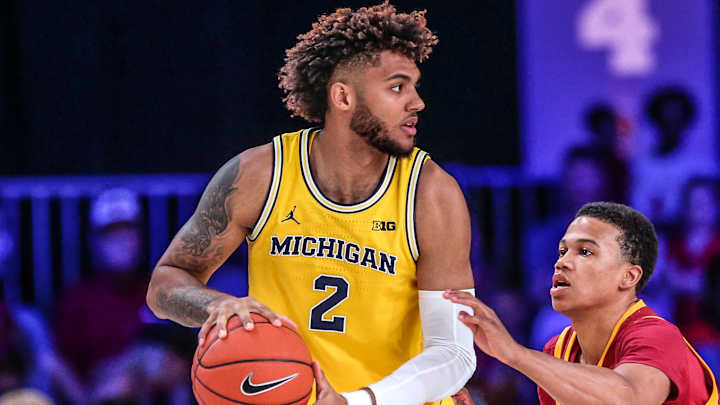Talking Points: Michigan Basketball Pre & Post-Op Of A Quiet Win To End 2019 For Liver-less Wolverines

Michigan head coach Juwan Howard spoke to the media for almost 13 minutes prior to his squad’s matchup against UMass Lowell and, in that time, did not field a single question on the River Hawks nor did he make a statement on the Wolverines’ Dec. 29 opponent.
There was no talk about the Wolverines immense size advantage over a team that does not have a player taller than 6-foot-7 on the roster, nor any comments on how U-M would try to exploit a struggling defense that ranks 316th in the country in Adjusted Defensive Efficiency. To someone who had not taken a look at the upcoming schedule, it would be hard to discern whether or not the Maize and Blue even had another game on the docket before closing out 2019.
The conversation was, instead, dominated by the news that junior forward Isaiah Livers will be out indefinitely with a groin injury suffered a week earlier in a victory over Presbyterian.
“I pray that we do,” Howard responded, palms pressed together, when asked if he anticipates getting the sharp-shooting junior back on the court at some point this season.
It looks like his prayers were answered, with the Kalamazoo-native’s status being upgraded from ‘out indefinitely’ to ‘day-to-day’, according to comments made by Howard on Jan. 3. Although he has been ‘active’ at practice according to Michigan’s first year head man, reports have indicated that it is unlikely he will be back in time for the Wolverines’ Jan. 5 clash with Michigan State in East Lansing—the biggest game of Howard’s young head coaching career.
Michigan was able to successfully navigate a 86-60 win over the River Hawks without Livers, but the challenge that lies ahead of it in MSU and the other Big Ten foes in its immediate future will be a different animal, especially with the junior leader on the court.
The Wolverines’ most efficient offensive player, Livers leads the team with a 122.7 Offensive Rating (ORtg), 63.6 Effective Field Goal Percentage (eFG%), 50.0 three-point shooting percentage and possesses a 12.5 Turnover Rate (TORate)—the lowest of any U-M contributor that has player more than 25% of available minutes (%Min) this season.
More importantly, Livers has consistently responded against Michigan’s toughest opponents. In Tier A games, or games KenPom advanced metrics considers to be against top 50 teams taking the location of the game into account, he has logged a 124.7 ORtg and just a 7.4 TORate while playing a team-best 88.6% of available minutes. His 46.9 three-point shooting percentage and 57.8 eFG%, although down from his season averages, are still considered very good by KenPom standards.
In eight Tier A games, Livers has recorded four ORtgs over 150 and only one under 90. In true road games, where the Wolverines have struggled with a below average 86.2 Adjusted Offensive Efficiency Rating, he has an average ORtg of 100.0. He is shooting 46.2% from beyond the arc and has registered a 55.6 eFG% in these contests. The rest of U-M’s shooters have hit just 16.1% of three-point tries and possess an abysmal 41.1 eFG% in hostile road environments.
Here is a look at a few additional quotes from Howard’s pre-UML press conference, and how those comments translated to the action on the court.
On what he’s looking forward out of the players stepping up to fill the void left Livers’ absence:
“You lose 14 points a game—I don't want anyone to feel like, because a guy who's been averaging 14 points, that I have to be the next man to give us 14 points or 16 points. No that's not the mentality, that's not what we're looking for. Be that guy to come out there and give us stability. To defend at the four spot sometimes at the three spot. To communicate our defense, be active defensively, play with a lot of heart, with a lot of passion and play the right way. I think the production will happen when you have that type of mindset.”
Against UMass Lowell, it was primarily sophomore forward Brandon Johns and sophomore forward/center Colin Castelon tasked to fill in at the four spot. In his first career collegiate start, Johns scored just six points and Castleton only four but both were productive in their other ways.
Johns, playing his typical energetic fashion, finished with a 127.0 ORtg, hitting all three of his two-point shot attempts, and grabbed four rebounds in 21 minutes. While Castleton shot just 2 of 6 from the floor (33.3%), his three offensive boards and three assists contributed to a favorable 103.0 ORtg. His nine-total rebounds were a career high and he also blocked a shot.
Defensively, the Wolverines were stout in the paint, limiting the River Hawks to just 7 of 19 shooting in the low-post during the first half (36.8%) to help build an insurmountable 42-25 halftime lead. In total, UML scored 26 in the paint, managed a paltry 45.0 eFG% and snatched only three offensive rebounds.
Although the road gets much tougher in the very near future, the promising performances by Johns and Castleton should, at the very least, prove an important confidence booster for the two heading into what appears to be at least one more game without Livers on the horizon.
On if dealing with the early-season injury to freshman forward Franz Wagner has made the team better equipped to deal with injuries to other key players, such as Livers:
“I have no idea if it helps. I know just from a coaching standpoint, it can be at times a little frustrating when you don't have your full roster out there.
“We need all 15 guys. Yes, we've handled some adversity early on with Franz being out and that was challenging for us. Now, with Isaiah, it's going to be even more challenging for our group, but we’re going to keep forging ahead and hopefully hold the fort down until he returns.”
Although Wagner has shown signs of potential since returning from injury, it is clear that the experience, consistency and overall production that Howard’s squad stands to lose in without Livers in the lineup has the potential to be a much greater challenge heading into the teeth of conference play.
Livers has not only been Michigan’s most productive offensive player as a junior, but he was also U-M’s’ most efficient offensive player on last season’s talented team—leading all
Maize and Blue players who logged significant minutes in ORtg (120.6), eFG% (61.8) and three-point shooting (42.6%), while ranking second in two-point shot percentage (58.4%) and TORate (11.3).
While a lot of the talk has revolved around the players that will be specifically depended upon to hold serve at the four until his return, it will be the contributions of key Wolverines at the other spots on the court that will ultimately determine where the Michigan sits in the league standings upon his return.
Against UML, it was senior center Jon Teske that picked up a majority of the slack with a career-best 25 points on 11 of 14 shooting (78.6%) against the woefully undersized River Hawks. Teske, who has stockpiled 10 games with an ORtg of 100.0 or better this season and is shooting 77.5% from two point range over the last five games, will continue to be integral if Michigan’s offense hopes to be efficient without Livers in the lineup. Senior point guard Zavier Simpson will also be a critical piece, although he has scored 10 or more points just once in his last six outings and his shooting numbers have dipped significantly over the last month—he has maintained a meager 43.4 eFG% and shot just 33.3% from beyond the arc in six December contests.
With both Teske and Simpson being limited three-point shooters, the Wolverines will need others to step up and consistently hit shots from deep. Junior guard Eli Brooks, U-M’s second leading three-point shooter, hit 3 of 7 deep balls (42.9%) against UMass Lowell and finished with a 47.6 three-point shooting percentage during the final month of 2019. Sophomore point guard David DeJulius is shooting 41.9% from downtown on the year, but has been held to one or fewer three-point makes in four of the last six games. He was one-of-three from three against UML.
The one player can step up and make the biggest impact in Livers’ absence, however, is Wagner if he can quickly begin to realize his potential at the collegiate level. Lauded as a sharp-shooter heading into his freshman year, he has struggled from the outside this season, shooting just 30.3% from three during his freshman campaign after missing his only three-point attempt against the River Hawks. Still, the potential is there, as displayed against No. 4 Oregon. He enjoyed a break-out 4 of 7 three-point shooting performance (57.1%) against the Ducks, but has not been able to build off of that momentum. He has hit just 1 of 4 three-balls (25.0%) in two games since, and is shooting 6 of 34 from three-point range (17.6%) outside of that contest.
Is Livers the most important player on this Michigan team? If not, who do you think is the one player they can least afford to lose? Comment below!!!
